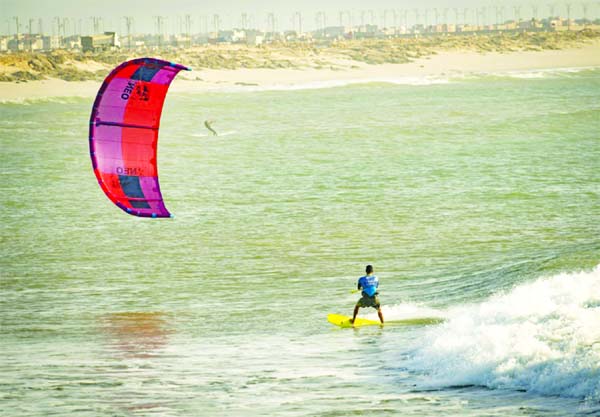
Agency :
In the heart of disputed Western Sahara, a former garrison town has become an unlikely tourist magnet after kitesurfers discovered the windswept desert coast was perfect for their sport.
In Dakhla, an Atlantic seaport town punctuated with military buildings in Morocco-administered Western Sahara, swarms of kitesurfers now sail in the lagoon daily.
“Here there is nothing other than sun, wind and waves. We turned the adversity of the elements to our advantage: that’s the very principle of kitesurfing,” said Rachid Roussafi.
After an international career in windsurfing and kitesurfing, Roussafi founded the first tourist camp at the lagoon at the start of the 2000s.
“At the time, a single flight a week landed in Dakhla,” the 49-year-old Moroccan said.
Today, there are 25 a week, including direct flights to Europe.
“Dakhla has become a world destination for kitesurfing,” said Mohamed Cherif, a regional politician.
Tourist numbers have jumped from 25,000 in 2010 to 100,000 today, he said, adding they hoped to reach 200,000 annual visitors.
The former Spanish garrison is booming today with the visitor influx adding to fishing and trade revenue.
Kitesurfing requires pricey gear-including a board, harness and kite-and the niche tourism spot attracts well-off visitors of all nationalities.
Peyo Camillade came from France “to extend the summer season”, with a week’s holiday costing about 1,500 euros ($1,660).
Only the names of certain sites, like PK 25 (kilometre point 25), ruined forts in the dunes and the imposing and still in-use military buildings in Dakhla, remind tourists of the region’s history of conflict.
In the 1970s, Morocco annexed Western Sahara, a former Spanish colony, and fought a war with the Algeria-backed Polisario Front from 1975 to 1991, when a ceasefire deal was agreed.
A United Nations mission was deployed to monitor the truce and prepare a referendum on Western Sahara’s independence from Morocco, but it never materialized.
Without waiting for the political compromise that the UN has been negotiating for decades, hotels have sprouted from the sand along the coast, and rows of streetlights on vacant lots announce future subdivisions.
“The secret to success is to develop kitesurfing with good communication focused on the organisation of non-political events,” said Driss Senoussi, head of the Dakhla Attitude hotel group.
Accordingly, the exploits of kitesurfing champions like Brazilian Mikaili Sol and the Cape Verdian Airton Cozzolino were widely shared online during the World Kiteboarding Championships in Dakhla last month.
The competition seemed to hold little interest for Dakhla’s inhabitants however.
In the heart of disputed Western Sahara, a former garrison town has become an unlikely tourist magnet after kitesurfers discovered the windswept desert coast was perfect for their sport.
In Dakhla, an Atlantic seaport town punctuated with military buildings in Morocco-administered Western Sahara, swarms of kitesurfers now sail in the lagoon daily.
“Here there is nothing other than sun, wind and waves. We turned the adversity of the elements to our advantage: that’s the very principle of kitesurfing,” said Rachid Roussafi.
After an international career in windsurfing and kitesurfing, Roussafi founded the first tourist camp at the lagoon at the start of the 2000s.
“At the time, a single flight a week landed in Dakhla,” the 49-year-old Moroccan said.
Today, there are 25 a week, including direct flights to Europe.
“Dakhla has become a world destination for kitesurfing,” said Mohamed Cherif, a regional politician.
Tourist numbers have jumped from 25,000 in 2010 to 100,000 today, he said, adding they hoped to reach 200,000 annual visitors.
The former Spanish garrison is booming today with the visitor influx adding to fishing and trade revenue.
Kitesurfing requires pricey gear-including a board, harness and kite-and the niche tourism spot attracts well-off visitors of all nationalities.
Peyo Camillade came from France “to extend the summer season”, with a week’s holiday costing about 1,500 euros ($1,660).
Only the names of certain sites, like PK 25 (kilometre point 25), ruined forts in the dunes and the imposing and still in-use military buildings in Dakhla, remind tourists of the region’s history of conflict.
In the 1970s, Morocco annexed Western Sahara, a former Spanish colony, and fought a war with the Algeria-backed Polisario Front from 1975 to 1991, when a ceasefire deal was agreed.
A United Nations mission was deployed to monitor the truce and prepare a referendum on Western Sahara’s independence from Morocco, but it never materialized.
Without waiting for the political compromise that the UN has been negotiating for decades, hotels have sprouted from the sand along the coast, and rows of streetlights on vacant lots announce future subdivisions.
“The secret to success is to develop kitesurfing with good communication focused on the organisation of non-political events,” said Driss Senoussi, head of the Dakhla Attitude hotel group.
Accordingly, the exploits of kitesurfing champions like Brazilian Mikaili Sol and the Cape Verdian Airton Cozzolino were widely shared online during the World Kiteboarding Championships in Dakhla last month.
The competition seemed to hold little interest for Dakhla’s inhabitants however.

